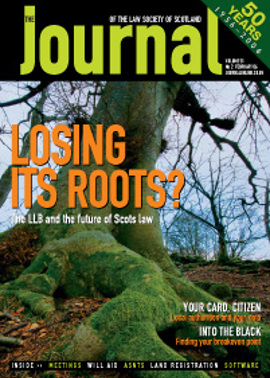Jurisdiction: dispelling the myth

Family law practitioners will all be familiar with Council Regulation (EC) 2201/2003, otherwise known as the Brussels II Convention, which came into force on 1 March 2005. In relation to the exercise of parental responsibility and, inter alia, rights of access, it provides that courts of a member state have jurisdiction, in matters of parental responsibility, over a child who was habitually resident in the member state, at the time that the court is seized. In the UK where there is more than one system of law applying in different territorial units, the habitual residence is that which is established in the territorial unit at the time.
Habitual residence enough
Accordingly, Scottish courts have jurisdiction in relation to children habitually resident in Scotland and the English courts have jurisdiction in respect of children habitually resident in England. It was thought, however, that where divorce proceedings between the parties had been concluded in Scotland, the Family Law Act 1986 remained the governing statute for divorce proceedings raised before 1 March 2005, and excluded jurisdiction of any other court in relation to the exercise of parental responsibility, on the basis that it was thought better to exclude all proceedings relating to children of a marriage from being dealt with in several courts (1986 Act, section 42(3)).
This principle has however been overtaken by Brussels II. Section 2 of the 1986 Act was amended following Brussels II coming into force. It is, therefore, good enough that jurisdiction exists by virtue of the child’s habitual residence, for a court to regulate parental responsibilities. This, of course, is excluded if divorce proceedings are “continuing” in a different territorial unit. There is, however, evidence of a practice amongst Scottish courts to continue in the belief that they hold jurisdiction having been seized of jurisdiction in the original divorce proceedings, and that a minute for variation of parental responsibilities may well be predicated on ill founded jurisdiction, in the event that the habitual residence of the child has altered since the conclusion of the divorce proceedings. The previous assumption that, as a minute for variation of any contact or residence orders is made in the original divorce process, this somehow means that proceedings “continue” in relation to the divorce, although not tested in a judicial forum, is not thought to be correct, as this would mean that throughout the childhood of any child of the marriage, regardless of where the child was living, the court seized in the divorce proceedings remained with exclusive jurisdiction.
The quirk of the minute
This is contrary to the principal thrust of Brussels II, where the guiding factor is the child’s habitual residence. This will alter as the child’s residence alters. This is consistent with the purpose of promoting the free movement of people across the European Union. Following a consistent approach through, it is merely a peccadillo of our system, that requires a minute for variation to be raised in the original divorce process, that is causing confusion. It cannot, sensibly, be argued that a minute for variation, raised in the same process as an action for divorce raised before 1 March 2005, constitutes “continuing” proceedings. After all, it follows summary application procedure as opposed to the ordinary rules.
The question of jurisdiction is therefore one we must all be careful to scrutinise before raising proceedings. In Carroll v Carroll, Sheriff Principal McInnes, 27 October 2005, while divorce proceedings were continuing in England, where both parties lived with their youngest son, Mr Carroll refused to return the child to England after holidaying in Scotland. Mrs Carroll had applied to the English court for a residence order and Mr Carroll was prohibited from removing the child from the jurisdiction of that court. Nevertheless, Mr Carroll did travel to Scotland and attempted to establish habitual residence and domicile within Scotland, raising proceedings and founding on the emergency jurisdiction under section 12 of the 1986 Act, as the child was present in Scotland and such an order was necessary for the child’s protection. The sheriff having been prepared to continue to decide on the matter, was appealed.
The sheriff principal upheld Mrs Carroll’s arguments that, as the child had been removed without consent, his habitual residence was deemed to be retained within England for a year and that, as Leicester County Court was actively engaged in matters concerning the child, matrimonial proceedings were “continuing,” excluding jurisdiction of the Scottish courts. Finally, the order sought – interim residence – did not require to be made immediately. The wording of section 12 anticipated a short term expedient necessary for the protection of the child, not the ordering of a lengthy report to assess the child’s views and best interests, which would still be considered in the English proceedings.
Fiona Sasan, The Morton Fraser Family Law Team
In this issue
- Legal aid in children's hearing referrals
- Still waters run deep
- Catch-up or patch-up?
- Legal science or law-lite?
- Heads above water
- Your name on file
- A welcome addition
- Another ***** meeting?
- A neglected asset
- Planning a year of action
- The Pagan mission
- A good case to read
- Jurisdiction: dispelling the myth
- That special something
- The art of cashing in
- Scottish Solicitors' Discipline Tribunal
- Website reviews
- Book reviews
- In on the Act
- Keeper's corner






